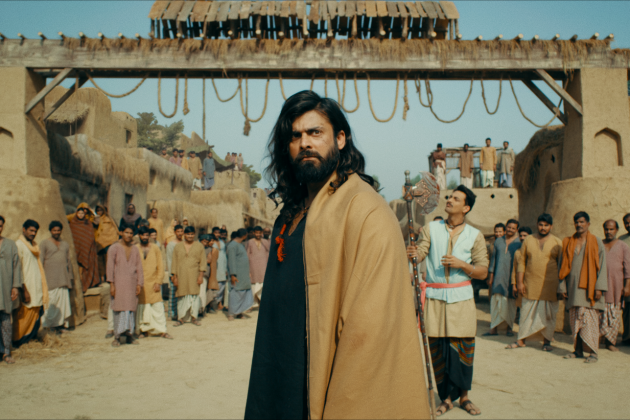Int’l Critics Line: ‘The Legend Of Maula Jatt’
- Oops!Something went wrong.Please try again later.
- Oops!Something went wrong.Please try again later.

It isn’t hard to believe that Bilal Lashari’s The Legend of Maula Jatt is, by some multiples, the most expensive film ever to come out of Pakistan. In the works since 2013, held up first by a copyright battle and then by Covid, it was finally released this month, thrilling audiences with its vast sets, elaborately choreographed set pieces and galaxy of stars: it is nothing if not lavish. It is also being vigorously touted as the catalyst that will revive the long-languishing fortunes of Lollywood, the Pakistani popular film industry. Time will tell. Audiences are certainly loving it.
Like Hollywood’s comic-book superheroes, the character Maula Jatt has repeatedly proved to be gilt-edged box office. The Punjabi avenger was immortalized in a 1979 epic, simply titled Maula Jat, that was also the most expensive film of its time and a huge hit; even before that, the character popped up in other films. An unofficial sequel, Maula Jatt in London, came out in 1981. Meanwhile, its success spawned a smattering of so-called Gandasa films, the gandasa being a Punjabi agricultural tool – a long handle with a large axe-head – that the hero repurposes as a home-grown weapon. Gandasa films reflected an ideal of regional village life; the weapon itself represents a folkloric tradition.
More from Deadline
'The Legend Of Maula Jatt' Becomes Highest-Grossing Pakistani Film Ever Worldwide
Int'l Critics Line: Zurich Audience Award Winner 'Becoming Giulia'
The Legend of Maula Jatt is, however, a very different beast – a beast with the claws of Game of Thrones, the horns of Lord of the Rings and the whipping tail of 300, with the gandasa itself becoming less of a fieldworker’s weapon of choice and more like Thor’s invincible hammer. One end has the halberd-like blade, while the other end has a retractable spike so thick it creates a porthole in anybody that gets in its way. Nothing about it screams sustainable crop management.
The story centers on a feud. On one side, the ultra-violent but honorable Jatts. On the other, the decadent, villainous Natts. This feud has apparently gone on for centuries; how it started doesn’t matter. What matters is that little Maula sees both his parents stabbed to death when the Jatt castle is invaded by a swarm of black-clad Natt Ninjas, a sight that will continue to resurface in his nightmares after he is adopted by a kindly village woman committed to hiding his identity. She raises him with her own son, a joker called Mooda; the two are closer than twins.
Flash forward – after a mere 11 packed minutes – 25 years. Maula (a bulked-up, bad-boy glamorous Fawad Khan) has grown up to become the carnival wrestler who never loses, with Mooda (Faris Shafi) as his wingman. But he still has those nightmares, now exacerbated by prodigious drinking; he even ignores Mukkho (Mahira Khan), the spirited woman who adores him. When he finally discovers how he came to be here and what the nightmares mean, he immediately embraces his birth family’s tradition. Maula, accompanied by Mooda as his Sancho Panza, goes forth for revenge.
The aging Natt Sardar, whose castle is the size of a mountain, has three villainous children. Younger son Maakha (Gohar Rasheed), is a twittering psychopath who regularly does the rounds to rape, extort and intimidate the quivering peasants. His older brother Noori (Hamza Ali Abbasi) is so hard he has voluntarily incarcerated himself in a prison for years so he can fight the meanest dudes in the Punjab. Disappointingly for him, none of them is quite mean enough.
Noori dotes on his extremely mean sister Daaro (Humaima Malik), who is inclined to cut off her cousins’ heads at the dinner table. Noori rescued Daaro from being buried alive as an infant by order of their father, who was ashamed of having a daughter. It is Daaro who persuades Noori to give up on prison life and claim the Sardar’s turban, which sets the stage for a series of fights in which either Noori or Maula will despatch dozens of assailants, roaring copiously – there is a lot of roaring in this film – and will culminate, entirely inevitably, in a clash of the two titans.
Spectacular as it is, Legend of Maula Jatt is a very blunt, rather old-fashioned instrument. Fawad Khan, usually busy charming his fans as a sophisticated smoothie, does everything possible to join his character’s dots, but he is largely a cipher for righteous fury. The relationship between Noori and Doora is intriguing, not least for its incestuous undertones, but it remains a tantalizing footnote. So does feisty Mukkho, whose flirtation with the strong, relentlessly silent Maula simply doesn’t get enough screen time to reach that fevered pitch of thwarted eroticism we expect off an epic romance.
You can see why. The focus has to be on these fighting men circling each other, twirling their mustaches and saying nonsense like, “If I told you my name, every vein in your body would explode, my dear!” It is these kinds of lines that became catchphrases with the original Maula Jat and made the avenger a cult figure; you wouldn’t want to lose the specific allure of the genre or, indeed, its regional identity. And don’t get me wrong: The Legend of Maula Jatt is coarse-grained fun from beginning to end, especially if you’re partial to a severed head. But you could hope for more complexity. A few more layers, maybe, below all that camped up rage.
Best of Deadline
Sign up for Deadline's Newsletter. For the latest news, follow us on Facebook, Twitter, and Instagram.
